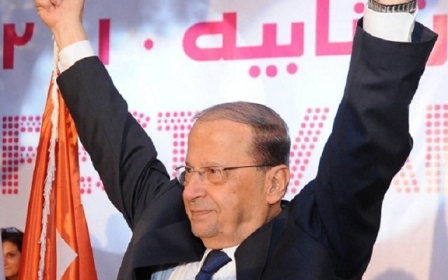UN Security Council, Mideast leaders welcome Lebanese president election
The UN Security Council and Middle Eastern leaders on Tuesday welcomed the election of Michel Aoun as Lebanon's new president.
The Security Council said forming a unity government and organising national elections next year would be critical for stability.
The council unanimously adopted the statement, a day after the 81-year-old former army chief, a Christian Hezbollah ally, was elected after four rounds of voting in parliament.
"The election is a long-awaited and critical step to overcome Lebanon's political and institutional crisis," the council statement said.
The election ended a two-year power vacuum at the top at a time when the country is struggling to cope with the impact of the devastating war in neighbouring Syria.
The council stressed that "the formation of a unity government and the election of a parliament by May 2017, in accordance with the constitution, are critical for Lebanon's stability and resilience to withstand regional challenges," the statement read.
Aoun received congratulatory phone calls from Syrian and Iranian presidents, Bashar al-Assad and Hassan Rouhani, according to the Lebanese National News Agency.
King Salman of Saudi Arabia also sent a diplomatic cable congratulating Aoun, Saudi official news agency SPA reported.
"We are pleased for your election as president of Lebanon and we send you on behalf of the people and the Government of the Kingdom of Saudi Arabia and in our name congratulations and best wishes for good health and happiness to your excellency, and to the brotherly people of the Republic of Lebanon progress and prosperity," the Saudi king said.
He also wished Aoun success in his mission to achieve stability in the "brotherly country" and maintain good relations between Saudi Arabia and Lebanon.
Beirut and Riyadh had a diplomatic fallout after Saudi Arabia cancelled an aid package for the Lebanese army in February following Lebanon's refusal to condemn attacks on the Saudi embassy in Tehran.
Saudi Arabia has complained of what it described as Hezbollah's dominance over the Lebanese government. Hezbollah chief has repeatedly condemned the kingdom's war in Yemen, and Riyadh opposes the Lebanese militant group's intervention in the war in Syria, where Hezbollah is fighting alongside Syrian government troops.
Stay informed with MEE's newsletters
Sign up to get the latest alerts, insights and analysis, starting with Turkey Unpacked
Middle East Eye delivers independent and unrivalled coverage and analysis of the Middle East, North Africa and beyond. To learn more about republishing this content and the associated fees, please fill out this form. More about MEE can be found here.




